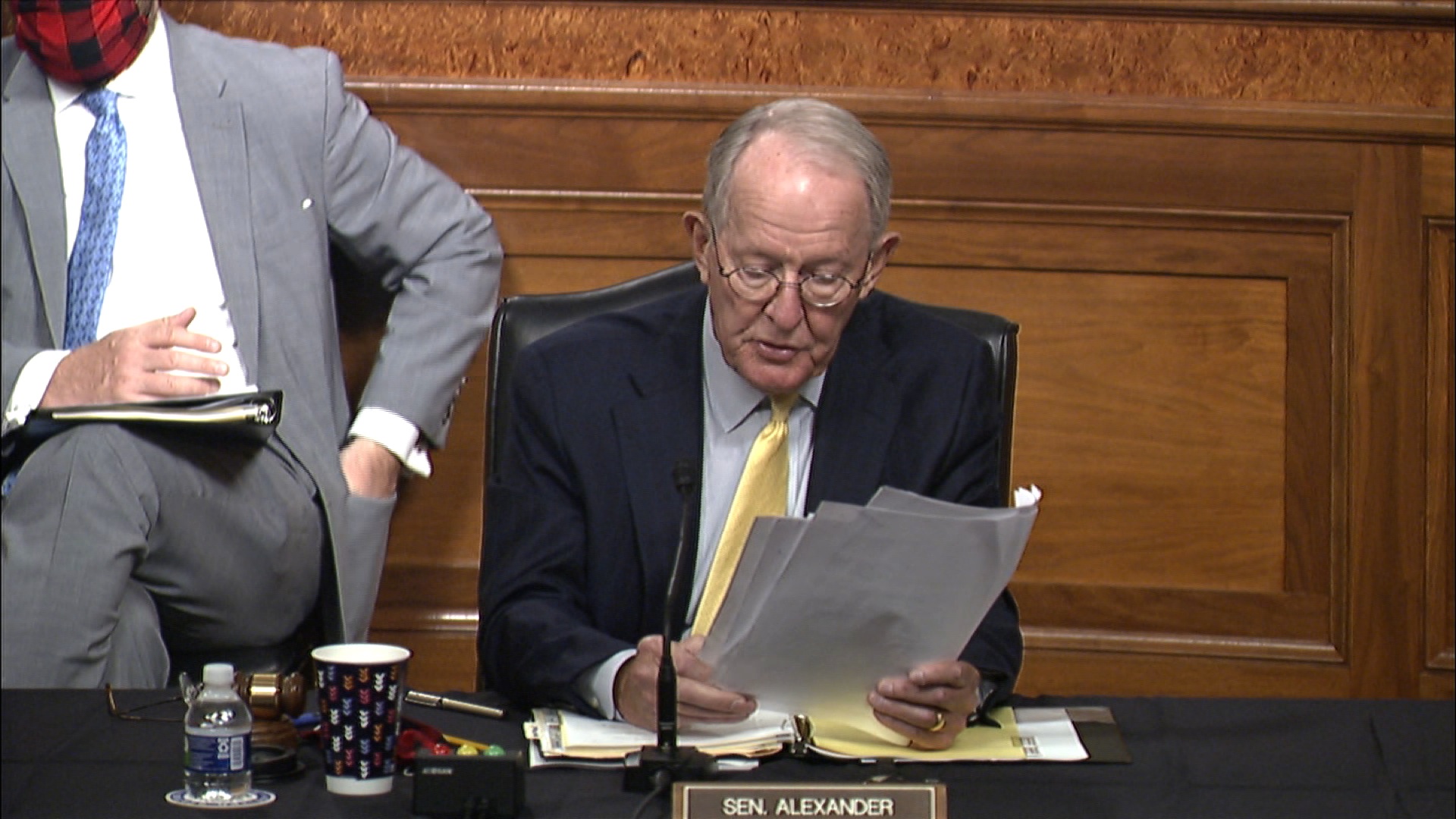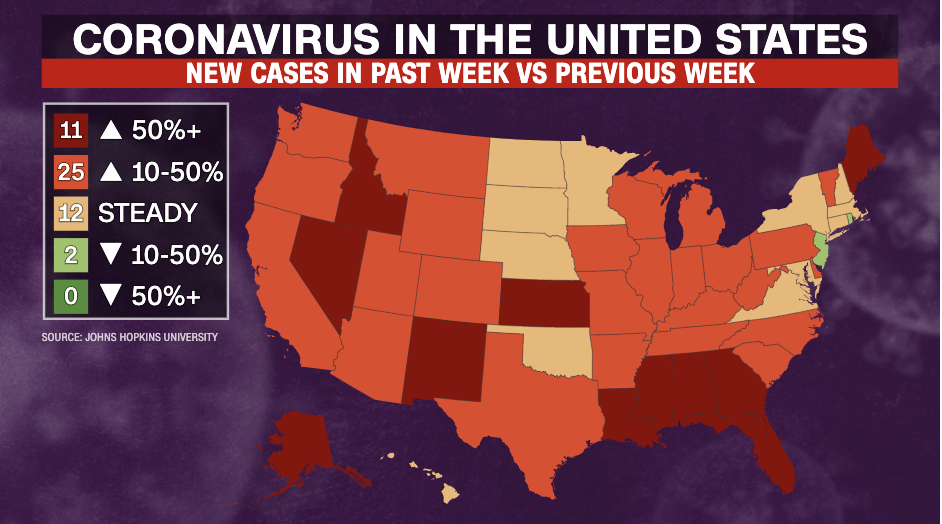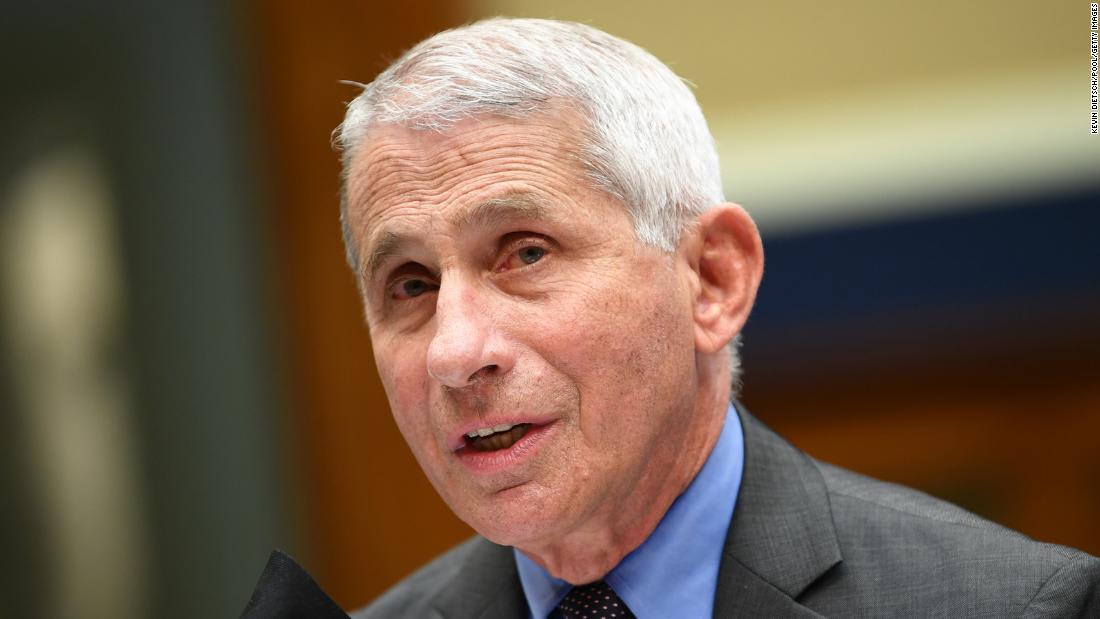The hearing has begun
 Pool
PoolDr. Anthony Fauci, the nation's top infectious disease expert, along with US Centers for Disease Control and Prevention Director Dr. Robert Redfield and other government officials are testifying before a Senate hearing on the country's progress toward safely getting back to work and school.
Sen. Lamar Alexander, a Tennessee Republican and chair of the committee, said members in the committee room are sitting six feet apart. All witnesses are participating in-person while some senators are participating remotely.
Alexander said masks can be removed when speaking, but he used his opening remarks to urge lawmakers and President Trump to wear mask so that his followers will "follow his lead." He said he has suggested that Trump occasionally wear a mask, even though in most cases it is "not necessary for him to do so."
"Unfortunately this simple life-saving practice has become part of the political debate," Alexander said.
Here's who is testifying soon before the Senate committee
The Senate committee on Health, Education, Labor and Pension is holding a hearing this morning formally titled, "COVID-19: Update on Progress Toward Safely Getting Back to Work and Back to School."
The hearing comes as the country continues to battle the public health and economic consequences of the pandemic, which has already claimed the lives of more than 120,000 in the US.
The hearing will include both in-person and remote member attendees, according to the committee.
Witnesses include:
Last week, the four witnesses testified in person before a House committee on the administration’s coronavirus response. Fauci told lawmakers "we're going to be doing more testing, not less," in response to President Trump's recent claim that he asked his administration to slow down testing during the pandemic.

Why experts say the spread of coronavirus is now hard to control
From CNN's Christina Maxouris
At least 16 states have paused or rolled back their reopening plans in response to a surge in new coronavirus infections, but some health officials say the spread of the virus will still be difficult to control.
"What we hope is we can take it seriously and slow the transmission in these places," said Dr. Anne Schuchat, the principal deputy director of the US Centers for Disease Control and Prevention, said Monday in a live-streamed event by the Journal of the American Medical Association.
"But what I think is very discouraging is we're clearly not at a point where there's so little virus being spread that it's going to be easy to snuff out," she said.
State and local leaders have said the rise in cases are in part driven by gatherings, both in homes and in places like bars — which some experts have called the perfect breeding ground for the virus.
But public health experts have also warned that some states also reopened far too soon and too quickly, cautioning the move could lead to more spikes in cases.
Over the weekend, California Gov. Gavin Newsom shut bars back down across seven counties and recommended their closure in several more. In Texas, bars were ordered shut while Florida suspended on-site alcohol consumption statewide.
Arizona shut down its bars, gyms, and other businesses for a month. Beaches in Miami, Fort Lauderdale and Palm Beach were also ordered closed for the upcoming holiday weekend.
New York Gov. Andrew Cuomo announced Monday the state will decide later this week whether to slow the reopening of indoor dining in New York City as it has "been shown to pose risks in other states."
Even with renewed measures, one expert says there's no proof that reclosing bars and other businesses will slow the resurgence of the virus in parts of the US.
"They're trying to see if they can do this surgically, meaning just close bars or 50% restaurants and encourage use of masks or in some cases mandate masks and stop short of that full lockdown," said Dr. Peter Hotez, dean for the national school of tropical medicine at Baylor College of Medicine. "What's the evidence that that will work?
Senators are weighing another stimulus package as some states roll back reopening
From CNN's Jamie Ehrlich
Republicans remain divided on the size and scale of the next stimulus bill and while it has been discussed for months, the next phase of economic relief is still weeks away. But there is now broad agreement something has to be done — something that wasn't always the case.
Senators have been weighing another stimulus package in recent weeks as unemployment numbers remain worrisome and economic hardship stemming from the pandemic persists.
In Capitol Hill's last round of aid, Congress boosted unemployment checks by $600 a week and added 13 weeks of pay, beyond what states offer.
The additional money will expire on July 31 without congressional action, but the 13-week extension will remain in place until the end of the year.
A second round of stimulus payments is on the negotiating table in Washington, but some of the 160 million Americans who got money the first time could be left out, according a more targeted approach the administration is pushing for.
Republicans have zeroed in on the last week of July to reach agreement on the next round of stimulus legislation. Senate Majority Leader Mitch McConnell has been adamant for weeks on that timeline and the administration is on board.
Some states get a "C" for coronavirus efforts, Fauci says
From CNN's Elizabeth Cohen
When asked what grade Dr. Anthony Fauci would give the country for handling the coronavirus outbreak, the director of the National Institute of Allergy and Infectious Diseases said some states were doing better than others.
"Some states are going to be A+. Some are going to be A and some are going to be down in C somewhere," Fauci said during a wide-ranging interview with CNN that was part of the Aspen Ideas Festival and aired Sunday night.
He singled New York out for doing "really well," but declined to name the "C" states.
"There are some states in which the leadership and the decision [to open up] was a little too precipitous," he said. "There are others when the leadership did it right, but the citizenry didn't listen to them.
Fauci said in states where you can see people congregating closely without using masks, "that's a recipe for disaster."
He added that he understands that people, especially young people, want to be together after months of lockdown. He warned those people that they're "not in a vacuum."
"The fact that you got infected means that it's likely that you'll infect someone else who might infect someone else who then will infect a vulnerable person," Fauci said. "That person could be someone's uncle, aunt, grandma, a child with leukemia who's immunosuppressed. All of the people who have a grave danger of a poor outcome."
Fauci warns possible Covid-19 vaccine may not get US to herd immunity
From CNN's Elizabeth Cohen
Dr. Anthony Fauci said Sunday that he would "settle" for a Covid-19 vaccine that's 70% to 75% effective, but that this incomplete protection, coupled with the fact that many Americans say they won't get a coronavirus vaccine, makes it "unlikely" that the US will achieve sufficient levels of immunity to quell the outbreak.
With government support, three coronavirus vaccines are expected to be studied in large-scale clinical trials in the next three months.
"The best we've ever done is measles, which is 97 to 98% effective," said Fauci, the director of the National Institute of Allergy and Infectious Diseases. "That would be wonderful if we get there. I don't think we will. I would settle for [a] 70, 75% effective vaccine."
In an interview Friday, CNN asked Fauci whether a vaccine with 70% to 75% efficacy taken by only two-thirds of the population would provide herd immunity to the coronavirus.
"No — unlikely," he answered.
Herd immunity is when a sufficient proportion of a population is immune to an infectious disease, either through prior illness or vaccination, so that spread from person to person unlikely.
Read and watch more of the interview:
Experts will testify today as at least 16 states pause reopening plans
From CNN's Christina Maxouris and Jamie Ehrlich
Dr. Anthony Fauci, the nation's top infectious disease expert, along with US Centers for Disease Control and Prevention Director Dr. Robert Redfield and other government officials will testify today in a Senate hearing on the country's progress toward safely getting back to work and school.
The Health, Education, Labor, and Pensions panel hearing comes as several states are struggling to contain the virus as cases counts continue to rise across the nation and states begin to reopen. Some 16 states have paused their reopening and at least 36 states are trending upward trends in cases compared to the previous week.
The US has reported more than 2.5 million cases of the virus and more than 120,000 deaths, according to Johns Hopkins University. The country reported more than 40,000 new Covid-19 cases on Friday, its biggest daily jump yet.
State and local leaders have said the rise in cases are in part driven by gatherings, both in homes and in places like bars — which some experts called the perfect breeding ground for the virus.
Here's where cases are increasing across the US:

Fauci and Redfield testified before lawmakers last week in the House, where Fauci said "we're going to be doing more testing, not less," in response to President Trump's recent claim that he asked his administration to slow down testing during the pandemic.
Senators have been weighing another stimulus package in recent weeks as unemployment numbers remain worrisome and economic hardship stemming from the pandemic persists.
Read the full story here.

 5 years ago
744
5 years ago
744 


